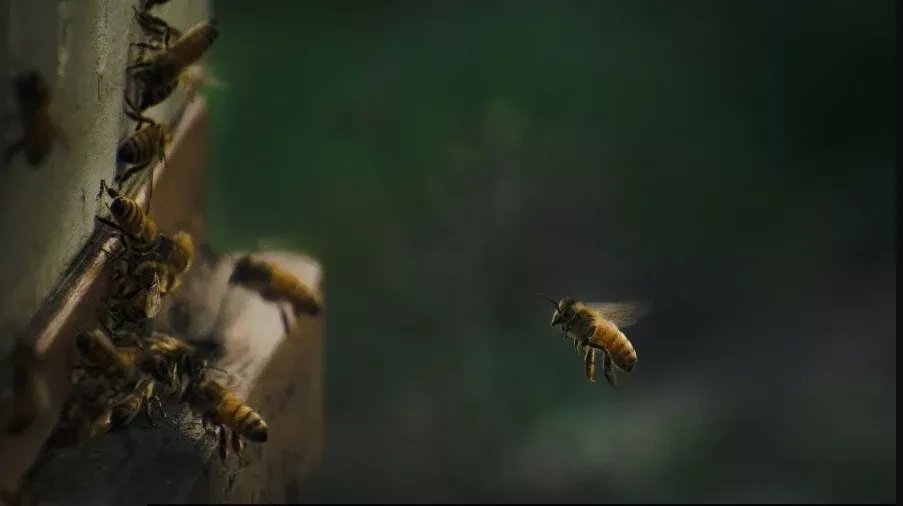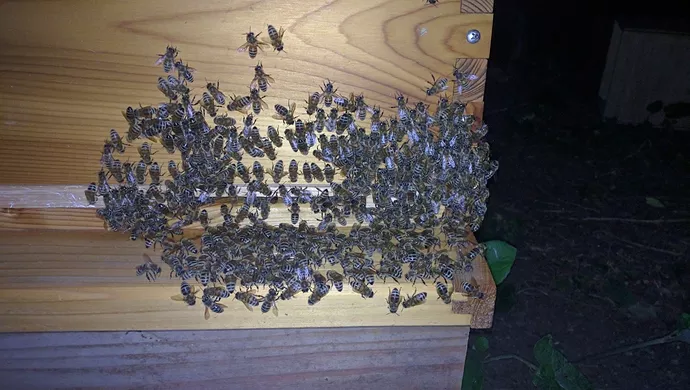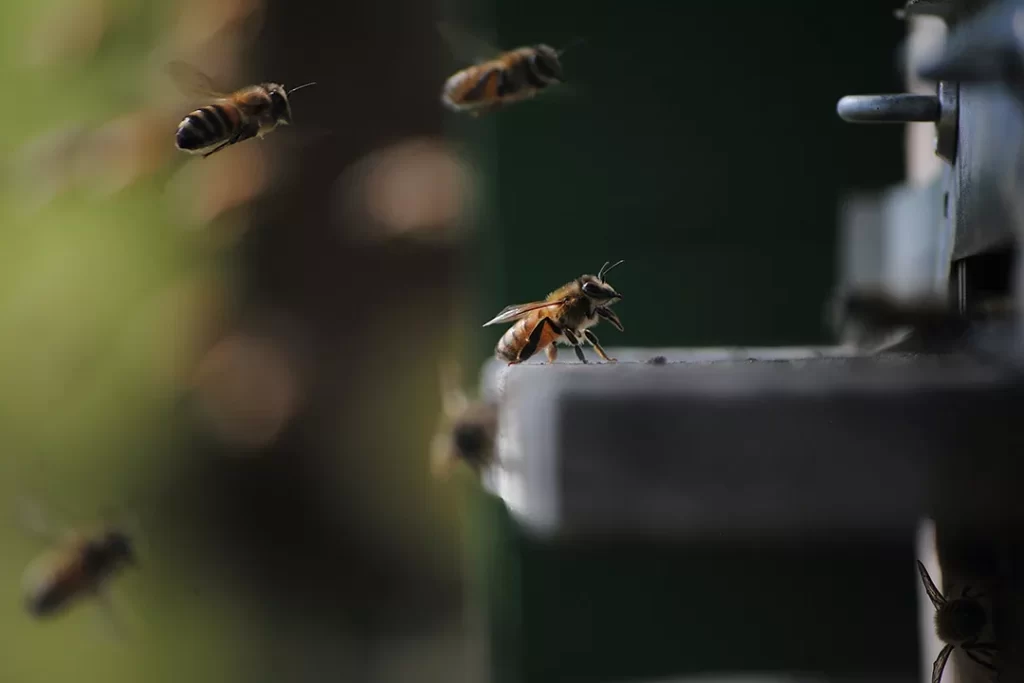If you’re starting beekeeping, you might be interested in how active bees are at night and whether they tend to sting or reduce stings when it’s dark outside? It’s good to know that I’m not the first person to consider sneaking into my hive late at night under the cover of darkness.

When bees sense danger, they sting day and night. They usually rest at night, but that doesn’t stop them from defending their colonies from attackers. Low temperatures and cold weather make bees much less stinging because they want to stay in the hive as much as possible. Cold weather may make them more docile than at night.
I’m glad to learn that this question has become the subject of scientific research. Researchers find that bees are more like us than you might think! Let me tell you why.
Do Bees Sting At Night?
If you ask this question, you will find that very few people, including beekeepers, have ever considered whether bees behave differently at night.
Many people might think that when it’s dark and late in the day, bee stings are reduced. But in most cases, it’s just a misunderstanding. This may be because not many people check their hives at night. Most of us like to stay at home when it’s dark.
In fact, bees can do whatever they want. This includes tingling at night. Of course not many people get stung after sunset because bees are in their homes (hives) just like us. Basically, there is very little chance of them interacting with us.
If you have a hive and decide to inspect or dispose of it and the bees at night, make no mistake – they won’t think twice about defending their home.
When the temperature is low, it is possible for bees to stay in the hive even if you are lurking nearby. But in this case, it’s the temperature, not the darkness, that stops the bees from coming out and stinging you.
The queen bee will sting you even in the dark. Finally, it is not uncommon for mature queens to sting developing queens before or even after hatching. As you can imagine, this sting occurs deep in the hive, where it is dark.
If you’re late for work on hives, don’t assume your bees won’t sting you. Keep in mind that most bees will also be home, which can make things more difficult. As always, wear protective clothing and use a smoker.
What Are Mining Bees And Do They Sting?
If You Have To Work With Bees At Night, What To Do?
Of course, you can also work with bees at night without hesitation. You just need to make sure you are fully prepared. My advice is to think ahead and prepare everything before departure.

Here are some tips:
- Always wear protective clothing as bees will still attack you if they feel threatened. There’s a good chance small animals will crawl into your suit and sting you, so make sure you’re well covered. Tape loose clothing if necessary.
- Using a smoker can make bees tamer. To see why you need one check out my tutorial on using the bee smoker here. If you’re already looking for one, read my post here on how to choose one + some advice.
- Use red headlights because bees can’t see red. They will be less inclined to attack you and your flashlight in this way.
What many beekeepers don’t know: There are far more bees in the hive at night than during the day. The more bees, the more likely you are to be stung.
Another thing to consider is that the bees will fly towards any strong light source at night. The bad news is that bees attack light sources because they see it as a threat. So if you’re near your hives at night, don’t shine a flashlight on them. However, you can cover the flashlight with a red filter or foil. Bees don’t respond to light as they normally would because they can’t see red.
What Happens To Bees At Night?
Just like us, most bees are inactive at night. Bees sleep, and they can even have slightly different sleep patterns depending on their role and age. For example, foraging bees typically sleep in a day and night cycle, while younger bees may sleep in a shorter pattern that may appear random at times. On the other hand, the queen bee lays eggs day and night and can also be awake at night.
Bees also have a so-called circadian rhythm, which is based on a day-night cycle and spends about 5 to 8 hours a day sleeping and resting.
So if you see a few active bees at night, you’ll see that they crawl more often than they fly.
Since bees are less active at night, some beekeepers prefer to move hives and nuclei to their new location late at night. Some sellers even want you to pick up your newly purchased nucs at sunset. This way you can make sure all your bees are home and of course they won’t fly away when they feel the hive move.
How Many Bees Are Left in the World?
What Happens When Bees Don’t Sleep?
Interestingly, researchers have uncovered some strange facts about what happens to bees at night. Here are a few:
- They have difficulty locating themselves because they often use the sky and local landmarks that they may not be able to see at night. When it gets dark, it will be difficult for you to visit the flowers and return to the hive. Some bees even get lost and cannot return.
- Lack of sleep can cause bees to have poor long-term memory like us. (2)
- Sleepless bees have a hard time communicating with each other. The dance they performed to convey the foraging position lost accuracy and precision. (3)
Are There Nocturnal Bee Species?
It is here that a bee called Megalopta is nocturnal. These bees are nocturnal.
You might wonder how they fly in the dark. Well, the answer is simple – they’ll develop a mental map and learn about landmarks around their hives.
This is how they use their memory to navigate and be active at night, even though they may not be able to see much. It’s not a good idea to move the hive at night with Megalopta bees, as they don’t move as easily as regular bees. It is best to move Megalopta bees during the day.

What Do Bees Do At Night?
As you can imagine, bees have very busy schedules. If you stand in front of a beehive on a hot, sunny afternoon, you can see the traffic on the highway during rush hour.
Imagine this – hundreds of bees come and go, doing their own work, each bee playing its part in the grand scheme of things. But as night falls, you’ll see their activity slow down and everything calms down before sunset. At night, you can walk around your hives effortlessly.
After dark, some bees rest in the hive, while others move like guards. Nurse bees and queen bees can also stay awake and active throughout the night. When the colony is stressed or in danger, you will notice a higher vigilance than usual. The bees can get very aggressive, there are more bees in the hive at night and things can get very out of hand.
How To Clear Cloudy Honey After Extraction?
Just like us, bees mostly rest at night. Some bees may be sleepier than others, just like young bees. Older worker bees have different sleep patterns and can also stay alert.

